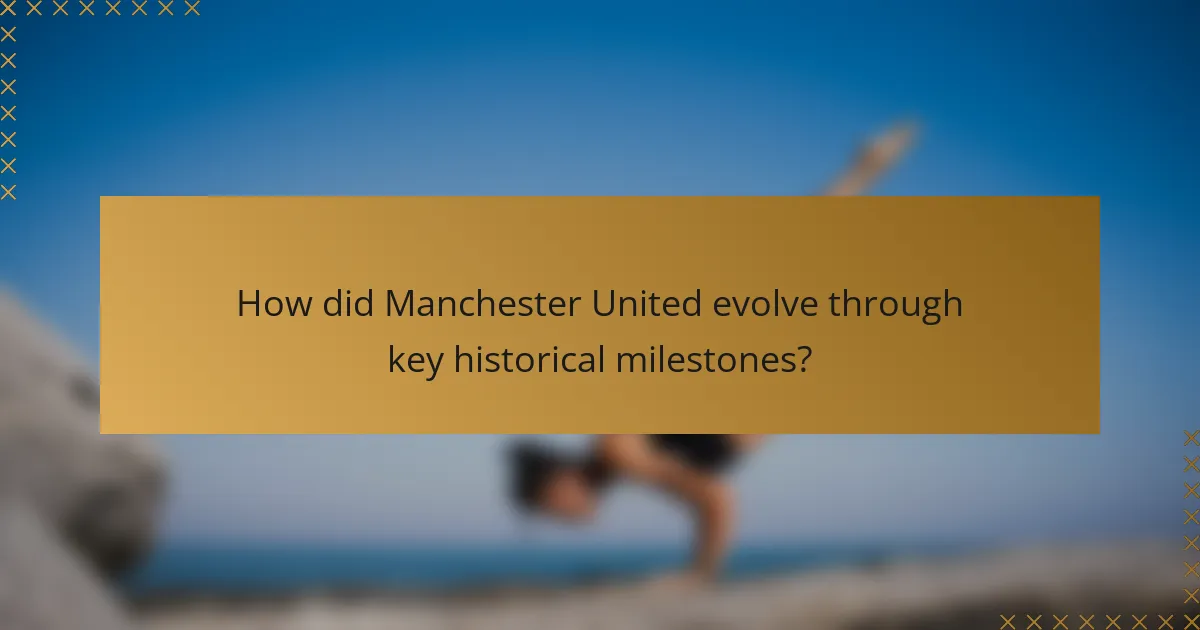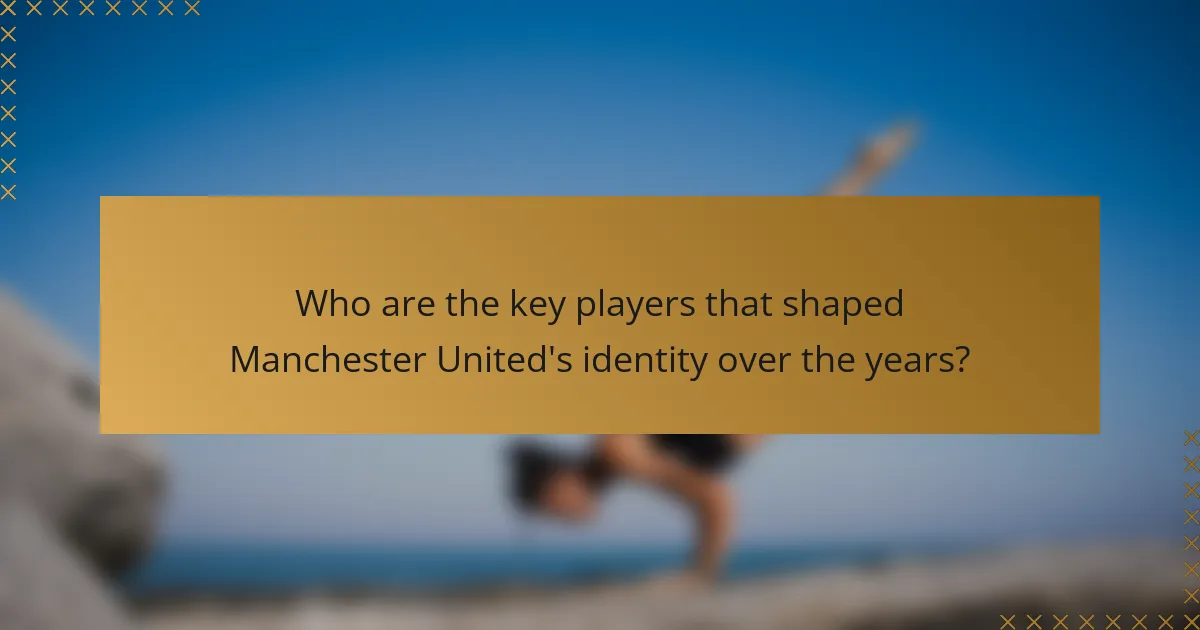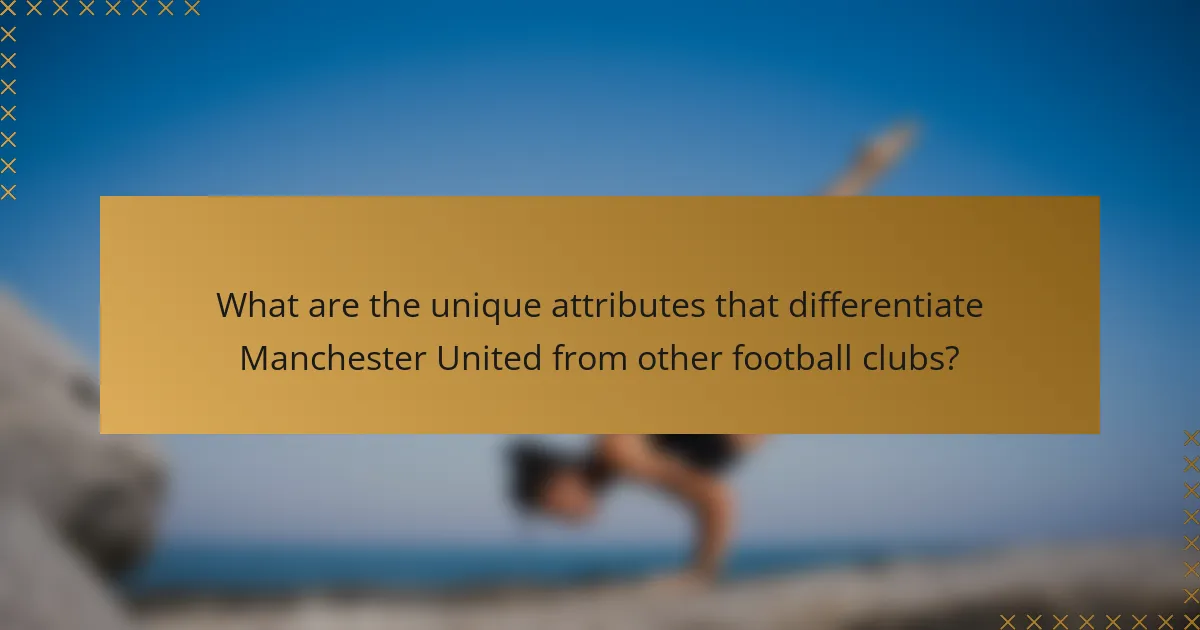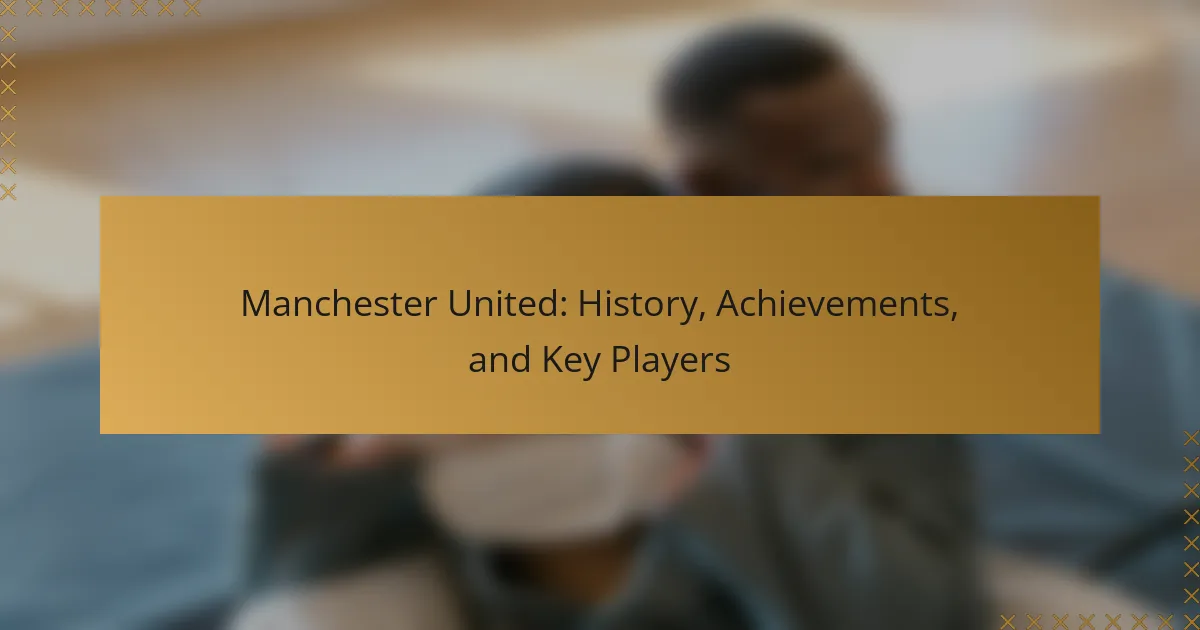Manchester United stands as one of the most successful football clubs in history, known for its rich legacy and global fanbase. This article explores the club’s historical milestones, significant achievements, and the key players who have shaped its identity. From its transformation in 1902 to the iconic treble-winning season in 1999, Manchester United’s journey reflects resilience and excellence. Additionally, the impact of legendary figures like Sir Matt Busby and Sir Alex Ferguson will be highlighted.

How did Manchester United evolve through key historical milestones?
Manchester United evolved through key historical milestones by adapting to challenges and seizing opportunities. The club’s foundation in 1878 as Newton Heath LYR Football Club marked the beginning. In 1902, financial troubles led to a rebranding as Manchester United, a unique attribute in its history. The 1945 appointment of Sir Matt Busby transformed the club’s playing style and philosophy, leading to the establishment of the famous Busby Babes. The tragic Munich air disaster in 1958 was a rare attribute that shaped the club’s identity and resilience. The 1990s saw the emergence of iconic players like Eric Cantona and Ryan Giggs, contributing to a historic dominance in English football. The treble-winning season in 1999, where they claimed the Premier League, FA Cup, and UEFA Champions League, remains a significant achievement. Today, Manchester United is recognized globally, with a rich legacy that continues to evolve.
What were the formative years of Manchester United’s establishment?
Manchester United was established in 1878 as Newton Heath LYR Football Club. The formative years included changing its name to Manchester United in 1902 after financial difficulties. Key milestones were winning their first league title in 1908 and the FA Cup in 1941. The club’s identity began to solidify during these early years, laying the foundation for its future successes.
Which events defined Manchester United’s rise in English football?
Manchester United’s rise in English football was defined by key events such as their 1990 FA Cup victory, the appointment of Sir Alex Ferguson in 1986, and the treble-winning season in 1999. These milestones established the club as a dominant force in both domestic and European competitions. The 1990 FA Cup win helped rejuvenate Ferguson’s tenure, while the treble solidified their legacy, showcasing their ability to compete at the highest levels. Other significant events include the 1968 European Cup win, marking their first major European success, and the emergence of legendary players like George Best and Eric Cantona, who greatly influenced the club’s identity and success.
How did the Munich Air Disaster impact Manchester United’s history?
The Munich Air Disaster profoundly shaped Manchester United’s history, leading to a significant transformation in the club’s identity and success. Following the tragedy in 1958, where eight players lost their lives, the club faced immense challenges.
The disaster prompted a rebuilding phase, leading to the emergence of legendary manager Matt Busby, who focused on youth development. This commitment resulted in the formation of the famous “Busby Babes,” a team that blended experience with youthful talent. The resilience demonstrated by the club in the aftermath fostered a culture of determination and ambition.
As a result, Manchester United achieved remarkable success in the following decades, including winning the European Cup in 1968, a tribute to the legacy of those lost. The disaster remains a pivotal moment, influencing the club’s ethos and strengthening its global fanbase.
What role did Sir Alex Ferguson play in shaping the club’s legacy?
Sir Alex Ferguson played a pivotal role in shaping Manchester United’s legacy through his leadership and strategic vision. He managed the club from 1986 to 2013, leading them to 13 Premier League titles, 5 FA Cups, and 2 UEFA Champions League trophies. His emphasis on youth development created a strong pipeline of talent, exemplified by the Class of ’92. Ferguson’s ability to adapt tactics and motivate players established a winning culture that remains influential. His legacy is characterized by resilience, innovation, and a commitment to excellence, solidifying Manchester United as a global football powerhouse.

What are the significant achievements of Manchester United in domestic and international football?
Manchester United has achieved significant success in both domestic and international football, making them one of the most decorated clubs in history. They have won a record 20 English league titles, 12 FA Cups, and 3 UEFA Champions League titles. Their unique achievement includes becoming the first English club to win the treble in 1999, which consisted of the Premier League, FA Cup, and UEFA Champions League in the same season. Additionally, they have secured 21 Community Shields and 1 FIFA Club World Cup, showcasing their dominance on various fronts.
Which trophies have Manchester United won in the Premier League era?
Manchester United has won 13 Premier League titles since the league’s inception in 1992. Their achievements include the following notable seasons:
1. 1992-93
2. 1993-94
3. 1995-96
4. 1996-97
5. 1998-99
6. 1999-2000
7. 2000-01
8. 2002-03
9. 2006-07
10. 2007-08
11. 2008-09
12. 2011-12
13. 2012-13
This record highlights Manchester United’s dominance in English football during the Premier League era.
How does Manchester United’s record in European competitions compare to other clubs?
Manchester United has a strong European competition record, ranking among the top clubs in history. They have won the UEFA Champions League three times and the UEFA Europa League once, showcasing their prowess. In total, they have reached the finals of European competitions 12 times, placing them in the elite category alongside clubs like Real Madrid and AC Milan. Their unique attribute is being the first English club to win the European Cup in 1968, highlighting their historical significance. Overall, Manchester United’s achievements in Europe reflect their status as a global football powerhouse.
What are the notable achievements in the FA Cup and League Cup?
Manchester United has a rich history in the FA Cup and League Cup, achieving significant success. The club has won the FA Cup 12 times, with their most recent victory in 2016. In the League Cup, they have secured the title 5 times, last winning in 2010. These achievements highlight Manchester United’s prominence in English football.

Who are the key players that shaped Manchester United’s identity over the years?
Key players who shaped Manchester United’s identity include Sir Matt Busby, George Best, Sir Alex Ferguson, and Cristiano Ronaldo. Sir Matt Busby established the club’s attacking style and youth development philosophy. George Best became an icon with his skill and charisma, while Sir Alex Ferguson transformed United into a global powerhouse, winning 13 Premier League titles. Cristiano Ronaldo’s return in 2021 reignited the club’s competitive spirit and global appeal. Each player contributed uniquely to the club’s rich history and legacy.
Which legendary players contributed to Manchester United’s success in the 20th century?
Legendary players who contributed to Manchester United’s success in the 20th century include Sir Bobby Charlton, George Best, and Eric Cantona. These players were pivotal in securing numerous titles and establishing the club’s global reputation.
Sir Bobby Charlton, a key figure from the 1950s to the 1970s, won three English league titles and the 1968 European Cup. His skill and leadership defined an era for the club. George Best, renowned for his dribbling and flair, helped Manchester United secure two league titles and the 1968 European Cup, becoming an iconic figure. Eric Cantona, who played in the 1990s, was instrumental in winning four Premier League titles and is remembered for his charisma and decisive goals.
These players embody the spirit and legacy of Manchester United, shaping its history through remarkable achievements and unforgettable moments. Their contributions are celebrated in the club’s lore, solidifying their status as legends.
What impact did modern stars have on Manchester United’s global appeal?
Modern stars significantly enhanced Manchester United’s global appeal through their talent and marketability. Players like Cristiano Ronaldo and David Beckham drew international attention, increasing fan engagement and merchandise sales. Their performances on the pitch translated into a broader fan base, especially in markets like Asia and the Americas. Social media presence further amplified their impact, allowing Manchester United to connect with millions worldwide. This synergy between star power and brand strategy solidified the club’s status as a global football giant.
How do Manchester United’s youth academy graduates influence the team?
Manchester United’s youth academy graduates significantly influence the team by providing homegrown talent that embodies the club’s values. These players often demonstrate loyalty, skill, and a deep understanding of the club’s culture. The academy has produced notable players like Ryan Giggs and Marcus Rashford, who have not only excelled on the pitch but also inspired future generations. Their contributions enhance team cohesion and performance, reinforcing the importance of nurturing young talent within the club’s framework.

What are the unique attributes that differentiate Manchester United from other football clubs?
Manchester United distinguishes itself from other football clubs through its rich history, global fanbase, and iconic players. The club’s unique attributes include a record number of Premier League titles, a pioneering youth academy, and a legacy of legendary figures like Sir Matt Busby and Sir Alex Ferguson. Additionally, its commercial success and brand value are unparalleled, making it one of the most recognized sports entities worldwide. The club’s commitment to community engagement and social responsibility further sets it apart in the football landscape.
How does Manchester United’s global fanbase influence its operations?
Manchester United’s global fanbase significantly influences its operations by driving revenue, shaping marketing strategies, and guiding player recruitment. The club’s estimated 1.1 billion fans worldwide create substantial income through merchandise sales, ticket sales, and broadcasting rights. This vast reach allows Manchester United to tailor marketing campaigns that resonate with diverse cultural backgrounds. Additionally, fan preferences can impact decisions on player signings, as the club seeks to attract players who appeal to its global audience.
What unique elements of Manchester United’s culture set it apart in football?
Manchester United’s culture is distinguished by its rich history, passionate fanbase, and commitment to youth development. The club’s legacy of success, including 20 league titles, fosters a winning mentality. Unique elements like the “Class of ’92,” which produced homegrown talents, emphasize its focus on nurturing players. The global reach and community engagement further set Manchester United apart in football.
How does the club’s financial model contribute to its status?
Manchester United’s financial model significantly enhances its status by maximizing revenue streams. The club generates substantial income through commercial partnerships, matchday sales, and broadcasting rights. For instance, in the 2022 financial year, Manchester United reported revenues exceeding £600 million, showcasing its strong market presence. This financial power allows for investment in top talent and infrastructure, maintaining competitive performance and global appeal. Additionally, the club’s unique global fanbase contributes to its merchandising success, further solidifying its status in the football world.

What challenges has Manchester United faced in recent years?
Manchester United has faced significant challenges in recent years, including managerial instability and inconsistent performances. The club has struggled to reclaim its status as a top contender in both domestic and European competitions. Financial pressures and player recruitment issues have also hindered progress. Additionally, fan dissatisfaction has grown due to perceived mismanagement and lack of clear direction.
How has managerial turnover affected team performance?
Managerial turnover at Manchester United has negatively impacted team performance. Frequent changes in management disrupt stability and consistency, leading to confusion among players and staff. For instance, the club has experienced multiple managerial changes since 2013, which have contributed to fluctuating performance levels. As a result, the team’s ability to build cohesive strategies and maintain morale has suffered, hindering overall success in competitions.
What are the implications of recent ownership controversies on the club’s future?
Recent ownership controversies could significantly impact Manchester United’s future, affecting its financial stability and fan support. The club’s brand value may decline if ownership issues persist, leading to potential loss of sponsorships. Furthermore, instability can hinder recruitment efforts, making it challenging to attract top talent. The club’s rich history and achievements could be overshadowed by ongoing disputes, risking its competitive edge in domestic and international tournaments. Ultimately, these controversies may reshape the club’s identity and long-term strategy.
How does Manchester United address the competitive pressures in modern football?
Manchester United addresses competitive pressures in modern football through strategic investment, talent development, and global branding. The club invests significantly in player acquisitions, ensuring a strong squad capable of competing at the highest levels. Additionally, Manchester United emphasizes youth development, nurturing homegrown talent through its academy system. This approach not only strengthens the team but also fosters a loyal fanbase. Furthermore, the club leverages its global brand to attract sponsorships and partnerships, enhancing its financial stability and competitive edge.

What best practices can fans adopt to support Manchester United effectively?
Fans can support Manchester United effectively by engaging positively and consistently. They should attend matches, wear team merchandise, and participate in fan events. Active online engagement through social media and forums fosters community. Additionally, constructive feedback to the club can influence decisions. Supporting local charities and initiatives enhances the club’s reputation and community ties.
How can fans engage with Manchester United’s community initiatives?
Fans can engage with Manchester United’s community initiatives through various programs and events. The club actively promotes social responsibility and encourages fan participation in local outreach efforts.
1. Volunteer Opportunities: Fans can participate in community service projects organized by the club.
2. Educational Programs: Manchester United offers workshops and seminars for fans, focusing on youth development and life skills.
3. Fundraising Events: Fans can join charity events, contributing to local and international causes supported by the club.
4. Fan Forums: The club hosts discussions where fans can share ideas and feedback on community initiatives.
5. Matchday Activities: Events on matchdays allow fans to engage with community projects and learn about ongoing initiatives.
What strategies can fans use to enhance their matchday experience?
Fans can enhance their matchday experience by engaging in various activities before, during, and after the game. Arriving early allows fans to soak in the atmosphere and enjoy pre-match events. Participating in fan zones provides opportunities for interaction and entertainment. Wearing team colors fosters a sense of unity and pride. Engaging with fellow supporters through chants and cheers creates a vibrant environment. Finally, sharing experiences on social media helps build a community around Manchester United.
Which common mistakes should fans avoid when supporting the club?
Fans should avoid overreacting to losses, spreading negativity, and disrespecting players. Staying positive and supportive fosters a better environment. Recognizing the club’s rich history and achievements can enhance the fan experience. Engaging constructively with fellow supporters strengthens community ties.
